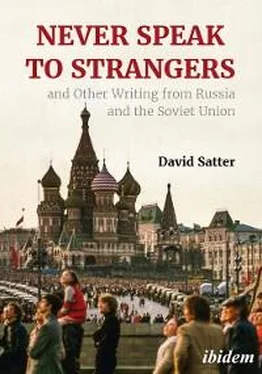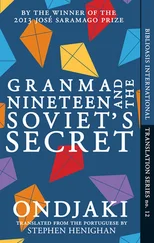I ended up working five more years for the Financial Times in Moscow and never again fell for a KGB provocation. Indeed, I became convinced that Terleckas was right and the whole point of the Soviet system was to create reality and then impose this world of illusions on a helpless population by force. In early 1983, I testified before the U.S. Congress on “Stopping Communism without War” and argued that the Soviet Union’s false ideology compelled it to create illusions and, as a result, the most effective weapon against communism was not arms but the truth. I published an article based on this testimony on the editorial page of The Wall Street Journal .
Several days after the article appeared, I wrote to Kestutis and enclosed a copy. Kestutis had succeeded in leaving Lithuania and was working for the Lithuanian service of Radio Liberty in Munich. A week later, a reply came that showed he had finally forgiven me for my mistakes in the Baltics. It said: “You did not spend your years in the Soviet Union in vain.”
Financial Times, Tuesday, August 17, 1976
Impressions of Moscow:
Beyond the Looking Glass
On a summer afternoon, Moscow from the Lenin Hills is a vast city of wide avenues and brownish yellow apartment blocks, crisscrossed by greenbelts of forests and parks. A meandering river divides it, lined by factories pouring smoke into a hazy sky and dotted by ancient churches with golden cupolas.
The city spreads out for miles, powerful, busy, like any other major capital. It is only down below, on crowded streets full of bare shops and communist slogans, that it is different.
Few, if any, cities can compete with Moscow in the style of its public pronouncements or the omnipresence of the police. Rooftop signs and placards extol comradeship, brotherhood and freedom. Posters on street corners call for an end to the arms race.
Even so, it is not Moscow’s progressivism that strikes one so much as that for the capital of a “peace-loving” society, it is unusually tightly controlled. Militia men are a common sight on the streets or in cars, traffic police are posted at virtually every intersection and armed guards stand watch 24 hours a day at the entrances to every one of Moscow’s embassies and foreign “ghettos.” Sometimes it seems that the city exists simultaneously on two different levels, propaganda and reality, with a continual effort being made to convince people that the first is the truth.
To help propaganda along, ordinary Russians are cut off from outside sources of information and from foreigners, who live, shop, and work in special facilities. The guards at the embassies and foreign ghettos give a friendly salute to foreigners they recognise. But if an unauthorised Russian approaches, they become sneering and, if the Russian has the nerve to try to get past, rough.
After a few weeks in Moscow, the new arrival begins to realise that he is living in an unreal world where there is little connection between what he is being told and what he knows to be true. Because of the control over information, what is obviously black can frequently be referred to as white.
Examples are everywhere. Although Soviet citizens will feel its effects for years to come, the 1975 harvest failure is always referred to obliquely in public and attributed exclusively to unfavourable weather conditions. Signs in restaurants announce that Thursday is “fish day,” not because of a nationwide meat shortage but to “balance people’s diets.”
Three middle-aged American correspondents are not only denounced as CIA agents and described for good measure as men whose adventures resemble those of “James Bond.” The attempt to construct reality is also extended to Soviet history, which is presented as a series of triumphs with little mention of its darker side.
Few foreigners realise how much attention is still devoted in the Soviet Union to the last war. It is a favourite subject of newspaper articles, television programmes and films. Posters printed last year to commemorate the 30th anniversary of the victory hang in people’s offices and flats, young men wear commemorative medals and people buy cups with 30th anniversary of the victory insignias.
There are human reminders of the war too, an entire generation of widows. They are a familiar sight in Moscow checking coats in restaurants, working as attendants in hotels or offices or sweeping the streets with twig brooms near the Kremlin Wall. They can be officious busybodies or sweet and kind-hearted but somehow the sight of them lends a certain credence to the Russians’ oft-repeated desire for peace.
On the other hand, there is not a word about the millions who died in Stalin’s purges and labour camps. Most of the old Bolsheviks put to death by Stalin remain non-persons in the country they helped found, and no guide is likely to point out “Solzhenitsyn Square,” on busy Leninsky Prospekt, where the now exiled writer worked as a prison labourer on a construction site, or the large grey house opposite the Kremlin where members of the Soviet elite lived a privileged existence until the fury of the purges in the late 1930s.
Reality is distorted in the Soviet Union. But the task of disentangling Soviet reality from Soviet propaganda, filling in the spaces deliberately left blank, is all the more difficult because the Soviets occasionally succeed, by concentrating enormous effort and talent in a specific area in injecting some truth into their propaganda-coated world.
The Soviet Union is a poor country with a standard of living far below that of the West. Yet the Soviets successfully launched two cosmonauts into outer space who may set a new endurance record. This achievement impressed people everywhere, but nowhere more than in Moscow itself because while the two cosmonauts were making a perfect link-up at the Salyut 5 space station, Soviets here on earth were getting stuck in lifts and taking months to complete the simplest job.
Maybe it is all an attempt to convince the world that Soviet society is capable of achieving the ambitious goals it has set itself. But most Soviet citizens react to propaganda by shutting it out or simply distrusting all sources of information. Foreigners have Western sources of information. But even they get affected by a society that tries to create its own reality. Most people speak of going to or coming from a country but foreigners in Moscow always refer to arriving in the Soviet Union as “coming in” and leaving as “going out.”
Chicago Daily News, Thursday, January 6, 1977
End of one delay just triggers another,
and not getting things done is an art
Soviets’ Long Queue to Nowhere
Every weekday morning, a crowd of nervous foreigners gathers on the steps of the Moscow Bank for Foreign Trade, waiting for the bank to open.
They come early because they know that as the morning wears on the atmosphere in the bank will deteriorate as the queues lengthen and angry arguments erupt between foreigners and bank employees.
The scenes at the bank are repeated at institutions throughout Moscow, and you would be struck by the similarity of the confrontations.
Everywhere, indifferent Soviet employees process reams of paper and figure sums on wooden abacuses, demanding official letters, receipts, passports and proofs of identity while irate foreigners forced to stand in long queues try to impress on them that they come from societies where time is a valuable commodity.
Although the Soviet Union to an outsider may seem to be a highly regimented, efficient society, anyone who lives in Moscow knows how maddeningly slowly the wheels of the Soviet bureaucracy turn.
“My advice is to have patience,” a long time foreign resident told me after I arrived. “You’re not going to change the Soviet Union, and if you try, you’ll only give yourself a headache.”
Читать дальше












